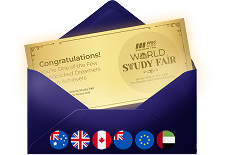How to Choose the Right University Ranking and Course for Your Career Goals
- Navdeep Kaur
- 8 min Read
Choosing the right university and course empowers Sri Lankan students to build careers that align with their passions, job market demands, and migration goals. Instead of chasing high global rankings alone, success comes from evaluating subject-specific strengths, graduate outcomes, and long-term value. Career-ready curriculums, internships, and PR pathways matter more than prestige. With expert guidance from PFEC Sri Lanka, students can confidently shortlist universities and courses that match their career vision, budget, and future goals—turning international education into a smart, life-changing investm

You may be excited to study abroad, but the flood of options can feel exhausting. Rankings look different on every site. Courses that sound impressive may not lead to jobs that interest you. Some degrees cost millions and offer little return.
Many Sri Lankan students feel stuck trying to figure out where to study and what to study. Choosing university rankings from Sri Lanka and comparing courses can feel too complex without the right filters. The good news is, you can make smart, confident decisions when you match your goals with the right data. Let’s help you get clear on what matters.
Define Your Version of Career Success First
Before checking rankings or browsing courses, ask yourself what success means to you. Is it a high-income role, global mobility, a job that creates impact, or long-term stability? Your answers will shape the right study path.
To gain clarity, reflect on:
- Where you want to be in 5–10 years
- What you enjoy and do well — solving problems, leading teams, designing, or analyzing data
- Fields that match your strengths — healthcare, tech, education, finance, law, or design
- Your work values — Is flexibility more important than salary? Do you want structure or freedom?
Being clear about your career goals will guide every major decision—especially when choosing between universities, countries, and specialisations.
Expert Tip: Reach out to alumni or professionals in your dream role. Ask what they studied, where, and what they would do differently. Their advice can save you time and costly mistakes.
Choosing University Rankings Sri Lanka Students Can Actually Use
Global rankings often impress, but they don’t always reflect what matters to you. Systems like QS, Times Higher Education, or ARWU are based on:
- Research output and faculty citations
- International student ratio
- Academic reputation among peers
- Staff qualifications and global partnerships
These indicators are helpful if you’re aiming for research or PhD pathways. But they say little about everyday student life or job prospects.
Here’s what most rankings leave out:
- Internship access and real-world exposure
- Graduate employability and campus recruitment data
- Affordability, scholarships, and ROI
- Student wellbeing support and teaching quality
- Post-study work rights and visa conditions
That’s why relying only on a rank can be misleading. Instead, ask:
- Will this course build the skills I need for the job I want?
- Does this university have links with companies in my industry?
- Can I afford the fees, and is the value worth it long term?
PFEC Sri Lanka course counseling helps you weigh rankings against practical outcomes. We help you align your academic path with real-world goals, so your investment pays off—in knowledge, experience, and career options.
How to Evaluate Rankings That Support Your Career Goals
When choosing university rankings, Sri Lanka students often focus only on global ranks. But overall rankings rarely reflect the quality of your exact course or career outcomes.
To make smart choices, learn how to read rankings the right way.
Subject Rankings vs Overall Rankings
Most rankings measure big-picture metrics—like research funding or academic citations. These help universities build prestige, but may not benefit you directly.
Instead, focus on subject-specific rankings. These compare universities based on teaching quality, faculty expertise, and employer reputation within a specific field.
Field | Use These Rankings | Why It Matters |
Engineering | QS by Subject, ARWU Engineering | Access to labs, research, and tech partnerships |
Business & Finance | QS Business Schools, FT Rankings | Strong industry ties and post-MBA ROI |
Arts & Humanities | Times Higher Ed Subject Rankings | Faculty quality, feedback culture, global appeal |
Health Sciences | CWTS Leiden, QS by Subject | Research exposure and clinical placements |
Expert Tip: Use filters on ranking sites like QS and THE to compare schools by course. This helps you find specialised programs that may not be top-ranked overall, but are industry leaders in your field.
Start With the Course, Not the University Name
A high-ranked university may not be the right fit if the course doesn’t serve your goals. Prestige matters—but only when paired with relevant, career-ready learning.
Instead of chasing famous names, prioritise:
- Curriculum quality: Does it offer electives or modules tied to your goals?
- Teaching approach: Is the focus academic, or does it include hands-on skills?
- Internships and co-ops: Are industry placements part of the program?
- Career outcomes: Where do graduates work, and how quickly do they get jobs?
- Visa and work rights: Does the country offer post-study pathways?
If you’re searching for the best courses abroad for Sri Lankans, focus on how a degree helps you build real skills and job opportunities. A well-structured, mid-ranked course with work placement can lead to better outcomes than a top-ranked university with little industry exposure.
PFEC Sri Lanka course counseling helps you evaluate both rankings and course fit.
7 Key Factors to Compare Between Universities (With a Career Lens)
When choosing university rankings, Sri Lanka students often overlook what really drives career success. A strong university name helps, but only when paired with the right opportunities, support, and outcomes.
Use these seven factors to compare universities beyond just rankings:
Factor | Why It Matters |
Industry Partnerships | More chances for internships, projects, and direct employer connections |
Research Strengths | Critical for STEM, postgrad, or PhD-focused students |
Employability Rates | Shows how many graduates find relevant work quickly |
Alumni Success | Helps you assess long-term value and real career growth |
Internship Options | Boosts work experience and post-study job offers |
Class Size & Faculty | Smaller classes often mean better mentorship and academic support |
Visa & PR Pathways | Essential if you plan to work or settle abroad after graduation |
Where to Find This Information:
- University career service pages and graduate employment reports
- QS Graduate Employability Rankings or THE Career Impact rankings
- LinkedIn alumni filters by course and job location
- Speak to PFEC Sri Lanka course counseling for career data, PR options, and student reviews
Expert Tip: PFEC compares over 200 institutions for ROI, PR support, and job outcomes. We guide you based on your academic goals, industry fit, and migration plans.
How to Shortlist the Best Courses Abroad for Sri Lankans
The right course decides more than your degree. It shapes your job options, visa routes, and long-term financial returns. Choosing smart now saves years later.
Here are top-value fields based on career demand, PR eligibility, and post-study outcomes:
Field | Why It’s Strong Abroad | Career Benefits |
AI & Cybersecurity | Growing global need across tech sectors | High salaries, remote flexibility, global mobility |
Nursing & Public Health | Staff shortages in Canada, UK, and Australia | PR priority, strong job market |
Engineering | In demand in Germany, Canada, and New Zealand | Pathways to licensing, stable long-term careers |
Business Analytics | Needed in every industry, not just finance | Versatile skills, high job placement |
Early Childhood & Social Work | Regional demand in countries like Canada | Easier PR, meaningful roles with job stability |
How PFEC Can Help:
- Match courses with in-demand career tracks
- Highlight programs with internships and co-ops
- Suggest universities offering scholarships
- Guide your planning for post-study work rights and PR routes
With PFEC Sri Lanka course counseling, you avoid low-value courses and focus on ones that lead to real outcomes. Your education should create options, not limits.
Balancing Reputation and Budget: What Sri Lankan Students Need to Know
When choosing university rankings, Sri Lanka students often focus only on prestige. But a high rank does not always mean a better outcome. The real question is whether a university offers value for what you spend — both during study and after graduation.
Use this framework to compare wisely:
Factor | Questions to Ask |
Tuition Fees | Is the cost justified by course quality and career outcomes? |
Living Costs | Can you afford housing, transport, and daily expenses in that city? |
Scholarships | Are there merit-based or need-based options that reduce your costs? |
Return on Investment | Will the course help you get a job abroad with a good salary? |
PR or Migration Pathways | Does the country offer work visas or permanent residency after study? |
Looking to offset study costs? Explore available scholarships in Australia that support Sri Lankan students financially.
Example:
Studying at a top-ranked Australian university can cost up to LKR 1 crore for two years. A mid-ranked university with strong job placement and lower tuition may cost 30% less — and still lead to similar outcomes.
Expert Tip: Always calculate your full study budget for 2 to 3 years. Include tuition, accommodation, travel, visa, and health insurance. Use currency conversion rates and buffers for inflation.
How PFEC Sri Lanka Course Counseling Saves You Time and Money
Choosing the right university and course can feel overwhelming. Many students spend months researching but still miss deadlines, overlook key requirements, or end up in the wrong course.
That’s where PFEC Sri Lanka services come in. Our advisors help you plan smart and not just fast.
How PFEC Helps You Decide Confidently:
- Aligns your course with long-term career goals, not short-term trends
- Recommends universities where you meet admission and visa eligibility
- Highlights scholarship options and cost-effective study destinations
- Explains post-study job markets, PR pathways, and work visa rules
Helps with SOP writing, English test prep, and application timelines
Common Mistakes Sri Lankan Students Make When Choosing Universities
Many students begin their journey with ambition, but poor decisions can cost time, money, and career potential. If you’re comparing options for studying abroad, avoid these common mistakes.
What to Watch Out For
- Relying only on global rankings
A university ranked in the top 100 globally may not be strong in your field. - Overlooking course content and delivery
Two degrees with the same name can vary in curriculum, practical exposure, and teaching style. - Following friends or relatives without research
Their choice might not suit your budget, skills, or long-term plans. - Ignoring total living expenses
Cities like Sydney, Toronto, and London can double your costs with rent and transport alone. - Missing migration or PR pathways
Some courses offer post-study work or direct PR advantages. Others don’t.
Skipping application deadlines or entry criteria
A missed test score or late submission can cost you an intake year.
Expert Tip:
When choosing university rankings, Sri Lanka students should focus on outcomes. Consider your career goals, budget, and post-study options. PFEC Sri Lanka course counseling guides you through this process with practical, unbiased advice.
Trusted Tools to Help You Choose Smarter (Free & Reliable)
You don’t have to guess or rely on random advice. These tools help you evaluate your options with real data — and plan your study path confidently.
Free Tools That Help You Make the Right Choice
Tool / Platform | Use Case |
QS & Times Higher Education | Compare global and subject-specific university rankings |
National Skills List / Job Outlook | Check in-demand jobs in countries like Australia and Canada |
University Course Finder | Filter programs by country, duration, and field of study |
Cost of Living Calculators | Estimate monthly student living costs in target cities |
LinkedIn Alumni Insights | See real outcomes of graduates from your shortlisted programs |
PFEC Sri Lanka course counseling | Get personalized shortlists based on goals and eligibility |
How to Use These Tools Effectively:
- Start with subject-specific rankings, not overall ranks
- Use job market data to see where your course is in demand
- Factor in full living costs, not just tuition
- Review alumni outcomes on LinkedIn to see where past students work
- Book a PFEC session to connect everything and avoid trial-and-error
PFEC Sri Lanka course counseling brings all these elements together. Instead of spending months comparing spreadsheets and websites, you get clear, expert advice — tailored to your career goals and finances.
Final Thoughts: Ranking Isn’t Everything — Fit Matters More
Choosing university rankings can feel overwhelming, especially when the stakes involve your future.
Think long term. Where do you want to be in five years? Do you need a course that leads to permanent residency, high job demand, or career mobility? These questions matter more than a logo or a number on a ranking site.
The best courses abroad for Sri Lankans are those that combine quality education, affordable tuition, post-study work rights, and long-term outcomes.
Students also considering the UK can check scholarships in the UK for merit and need-based support.
Book a free counseling session to find your best-fit course and destination with clarity.
FAQs: Choosing University Rankings and Courses Abroad
How should Sri Lankan students interpret global university rankings?
Use rankings to understand research and reputation. For career outcomes, subject-specific rankings are more useful.
What matters more — university rank or course content?
Course content matters more. It affects your skills, visa chances, job prospects, and PR pathways.
How do I know if a course leads to PR in Canada or Australia?
Speak to PFEC counselors. They map courses to in-demand occupations in PR-friendly regions.
Are there affordable universities with good rankings for Sri Lankan students?
Yes. Countries like Canada, Germany, and Australia offer low-tuition or scholarship-supported options in high-demand fields.
Can PFEC help me compare study options across countries?
Absolutely. PFEC Sri Lanka course counseling offers side-by-side comparisons across rankings, fees, visa success, and job outcomes.

 Sign Me Up →
Sign Me Up →

